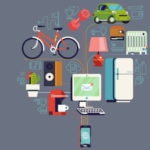The Internet of Things is already here
The Internet of Things (IoT) is on the verge of changing the face of business as we know it. Much has been said in recent years about the final and irreversible rise of the IoT, not only in smart homes and cities, but especially in large corporations and most industries.

All sectors are going to be affected to a greater or lesser extent. from retail to banking, including telcos, utilities, the auto industry, tourism, logistics operators, transportation companies, with a special impact on the aeronautics and aerospace industry.
Finance and insurance, according to Cisco, will be the 4th industry in terms of IoT impact, after the manufacturing industry, retail trade and information services. Almost 58% of CEOs and CIOs in the banking industry see IoT as something strategic and rank the technology 4th in terms of disruptive impact, after mobility, Big Data and Open APIs.
This transformation - that could be dubbed almost post-digital - will affect virtually all industries and comes after years of waiting and of relentless commitment by the likes of Intel, Cisco, IBM, Red Hat, Microsoft, Google or Apple. A key factor in the takeoff and consolidation of the IoT has been the sharp drop in prices of production, connection and mass storage of data coming from physical devices (hardware, sensors, beacons, wearables, etc.) Another key factor has been the rollout of highly advanced and specific technology platforms in the market to implement IoT horizontally in basically any organization to coordinate devices, processes and people.
The Internet of Things’ impact across industries and large corporations
Cisco, one of the big technology promoters of the IoT paradigm, estimates that the economic impact of the IoT will reach $19 trillion by 2020 while General Electric points to a global GDP growth ranging between $10 and $15 trillion linked to the effective appllication of the IoT in companies and the productive sector.
Also, Gartner in its Hype Cycle for Emerging Technologies expected to have a bigger impact, placed the Internet of Things at the summit, together with Wearables, self-driving vehicles and Machine Learning (as a way of primitive IA).
In fact, and despite the IoT being a “transformational” technology itself, the benefits it will bring to the Industry at large and to people’s lives will be further amplified thanks to the coincidence in time with other accelerating and disruptive technologies that are reaching a mature stage, such as Artificial Intelligence, Blockchain, APIs, additive manufacturing, improvements in biometric technologies or the mass adoption of wearables in the market.
The great disruptive impact of the Internet of Things will be the result of this crucial technological concurrence: the perfect storm for a paradigm shift at an industrial, financial and commercial level.
Internet of Things and Artificial Intelligence: the third wave of the internet is the data wave
If in 2020 40% of the volume of data generated worldwide will come from communications between devices, according to IDC. How much knowledge would it be possible to extract from this enormous amount of data if the machines themselves were able to learn from it thanks to the application of Machine Learning techniques?
According to IDC, by 2020 we will reach a 50 trillion gigabytes of stored data at a global level. Most of these data will be generated by the over 40 billion online smart devices (mobiles, computers, sensors, wearables, cars, industrial machinery, beacons, etc.) that will be in operation. The Internet of Things is, first and foremost, an enormous source of data that can be turned into valuable knowledge using the adequate technology and procedures.
To realize how intimately related the Internet of Things and Artificial Intelligence are, one just needs to take a look at how IBM merged, a few months ago, its IoT platform with Watson, its cognitive computing system, dubbing it IBM Watson Internet of Things.
Besides technology industries, the power industry was one of the first movers in the field of IoT. Indeed, the smart-meters installed in households generate a constant flow of real time information, that helps drive energy efficiency and reduce costs both on the side of the consumer and of the company supplying the energy.
This combined use of IoT and data analysis has also helped companies such as Boeing or Airbus to become more and more efficient and safe, monitoring a broad range of aircraft components by means of hundreds of sensors. This has allowed these companies to create advanced models and predict abnormal situations before they occur while improving the performance, safety and robustness of the airplanes themselves.
In fact, it is becoming more and more evident that one of the greatest contributions of the IoT will be the generation of a tremendous amount of data which, if properly analyzed, will provide further insights into customers, businesses, the environment and the market, even to predict and model the present and future behavior of any of them.